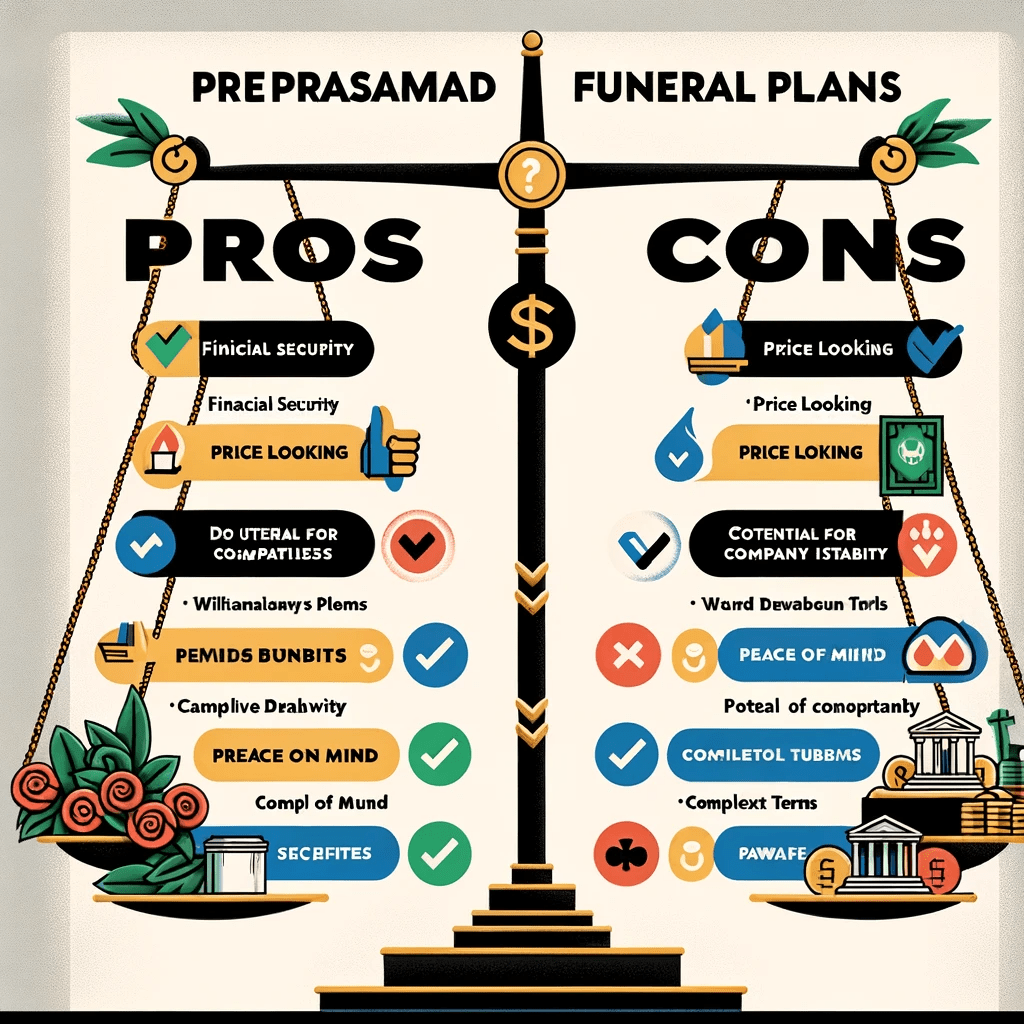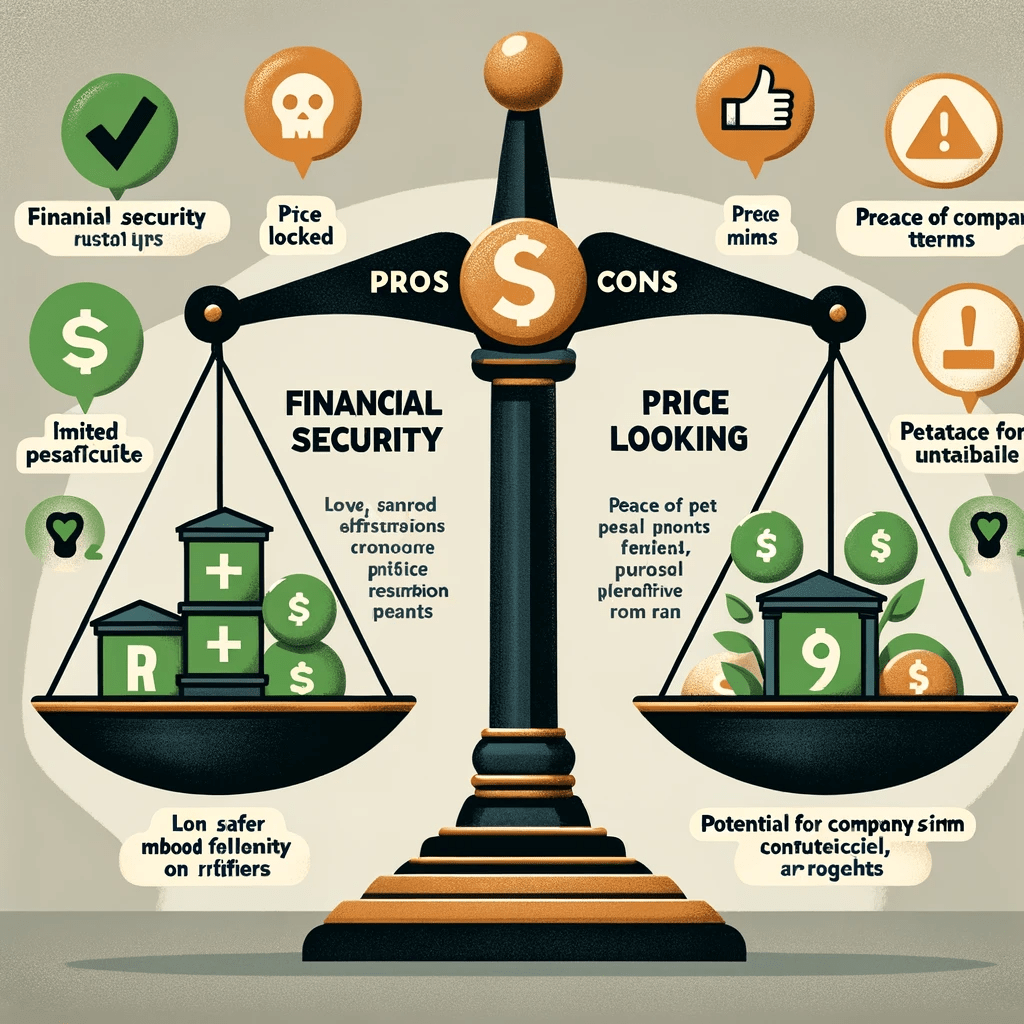In today’s uncertain times, planning for the inevitable is a responsible and caring step towards securing your loved ones’ future. One such option that many individuals are considering is the prepaid funeral plan. This comprehensive guide aims to explore the various aspects of prepaid funeral plans, shedding light on their benefits and potential drawbacks. From understanding the components included in these plans to delving into the different types available, we will provide insights into the pros and cons of opting for a prepaid funeral plan. We will discuss alternative avenues for financial planning, empowering you to make informed decisions about your end-of-life arrangements. Whether you are contemplating a prepaid funeral plan for yourself or a loved one, this article aims to equip you with the knowledge needed to navigate this important decision.
So, let’s dive into the complexities and considerations surrounding prepaid funeral plans.
Pros and Cons of Prepaid Funeral Plans
Understanding the pros and cons of prepaid funeral plans is essential for individuals and families considering options for funeral arrangements and financial planning.
By prearranging and prepaying for funeral services, individuals can alleviate the emotional and financial burden on their families. Prepaid funeral plans can lock in current prices, protecting against inflation and unexpected expenses. They also provide the opportunity to personalize the funeral according to one’s wishes.
It’s crucial to carefully review the terms and conditions of prepaid plans, ensuring transparency and understanding of what is included and any restrictions that may apply. Factors such as the financial stability of the provider and potential changes in the individual’s circumstances should also be considered.
Understanding Prepaid Funeral Plans

Understanding prepaid funeral plans involves gaining insight into the various options available for individuals to prearrange and prepay for their funeral services. It encompasses an array of considerations, including financial implications, service preferences, and the impact on family members and loved ones.
What’s Included in a Prepaid Funeral Plan?
A prepaid funeral plan typically includes a comprehensive range of funeral services and arrangements, such as the selection of casket or urn, embalming, transportation, ceremony coordination, and burial or cremation options. These plans aim to alleviate the burden of decision-making from loved ones during a difficult time.
Understanding the importance of honoring the departed, these plans also cover the arrangement of the service itself, floral tributes, and provision of vehicles for family and guests. They often incorporate the necessary legal and administrative aspects, enabling individuals to outline their preferences well in advance. By doing so, they seek to provide peace of mind and financial security, sparing family members from the emotional and financial strains of organizing a funeral during a time of grief.
Types of Prepaid Funeral Plans
Prepaid funeral plans encompass two primary types: Trust-based plans and Pre-Need Insurance. Trusts involve setting aside funds for future funeral expenses, while Pre-Need Insurance allows individuals to purchase a policy that covers their desired funeral arrangements.
Trust-based prepaid funeral plans typically involve depositing funds into a trust account, which is managed by a third-party trustee, ensuring that the money is safeguarded and available when needed. On the other hand, Pre-Need Insurance operates as a policy that pays out a predetermined amount upon the policyholder’s passing. This amount goes towards covering the funeral expenses detailed in the policy. Both options cater to individuals looking to alleviate the financial burden on their loved ones at the time of their passing.
Trusts
Trusts for prepaid funeral plans involve the establishment of a fund, held in trust, to cover future funeral expenses. This approach offers individuals the assurance that their funeral costs will be covered, often in line with their specific preferences and arrangements.
Pre-Need Insurance
Pre-Need Insurance represents a prepaid funeral plan option that allows individuals to purchase an insurance policy to cover their chosen funeral expenses. This approach provides a structured financial mechanism to ensure that funeral costs are accounted for and managed.
One of the key features of Pre-Need Insurance is the ability for individuals to make specific arrangements for their funeral, such as selecting the type of service, casket, and other related expenses. By locking in these choices and pre-paying for them, individuals can alleviate the financial burden on their loved ones and secure the desired arrangements.
Moreover, Pre-Need Insurance offers the benefit of protecting against inflation. As funeral costs tend to rise over time, having a prepaid policy can shield individuals and their families from the impact of increasing expenses. This provides added peace of mind and stability in financial planning for end-of-life needs.
Pros of Prepaid Funeral Plans
Prepaid funeral plans offer numerous advantages, including the ability to lock in current costs, alleviate financial burdens on loved ones, and ensure that personal preferences for funeral arrangements are honored. These plans provide peace of mind and financial security for both individuals and their families.
With a prepaid funeral plan, individuals can effectively manage the costs of their funeral, eliminating the impact of inflation and rising prices. This not only eases the financial strain on surviving family members but also allows for a more seamless transition during a challenging time.
By outlining their specific wishes in advance, individuals can rest assured that their funeral will be conducted in accordance with their desires, providing a sense of comfort and closure for their loved ones.
Cons of Prepaid Funeral Plans

Despite their benefits, prepaid funeral plans also present potential drawbacks, such as limited transferability, complex terms and conditions, and the risk of funeral service provider insolvency. Changes in personal circumstances and preferences may impact the suitability of prepaid plans over time.
While prepaid funeral plans offer the advantage of securing funeral arrangements at today’s prices and sparing loved ones from financial burdens, they typically lack full transferability if the planholder wishes to change providers or locations. The intricate terms and conditions of these plans can be challenging to navigate, possibly resulting in unforeseen costs and services not entirely meeting expectations.
One significant concern revolves around the financial stability of the funeral service provider. If there is insolvency, there may be a risk that the funds paid into the plan will not be available to cover the funeral expenses as originally intended, leaving the family with unexpected costs.
Personal circumstances and preferences can evolve over time, potentially rendering the prepaid plan unsuitable or limiting the flexibility to adapt to changing needs. Therefore, careful consideration and professional advice are vital before committing to a prepaid funeral plan.
Alternatives to Prepaid Funeral Plans
Individuals exploring funeral planning have alternative options beyond prepaid funeral plans, such as making investment arrangements with financial advisors, considering generational wealth implications, and understanding the potential benefits of Employee Stock Purchase Plans (ESPP). These alternatives offer diverse approaches to managing future financial needs and funeral arrangements.
Investment planning is a viable option for individuals looking to strategically allocate funds for future expenses, including funeral arrangements. Financial advisors can provide valuable insight into diversified investment portfolios, ensuring potential growth and protective measures against inflation. By considering generational wealth implications, individuals can explore the long-term impact of their financial decisions, taking into account the needs of future generations.
Employee Stock Purchase Plans (ESPP) present an opportunity for employees to purchase company stock at a discounted rate, potentially contributing to a well-rounded financial portfolio.
Make an Investment Plan With a Financial Advisor
One alternative approach to prepaid funeral plans involves seeking professional guidance from financial advisors to create personalized investment plans that align with future financial needs, including potential funeral expenses. This strategy provides individuals with tailored financial solutions tailored to their specific circumstances and goals.
Financial advisors leverage their expertise and knowledge of market trends to develop investment strategies that address both short-term and long-term financial objectives. By understanding a client’s unique financial situation and aspirations, advisors can create a customized investment portfolio that considers factors such as risk tolerance, time horizon, and desired returns.
Working closely with a financial advisor allows individuals to stay informed about their investment progress and make adjustments as needed to ensure that their financial plan remains aligned with their changing needs. Financial advisors can provide holistic financial guidance beyond investment planning, encompassing areas such as retirement savings, estate planning, and insurance coverage.
Considerations for Generational Wealth
Exploring the implications of generational wealth and legacy planning offers individuals an alternative perspective on managing future financial needs, including potential funeral expenses. By considering generational wealth, individuals can create a comprehensive approach that addresses long-term financial goals and familial responsibilities.
Legacy planning involves the strategic distribution of assets to future generations, ensuring a lasting impact beyond an individual’s lifetime. It encompasses a range of financial tools such as trusts, estate planning, and charitable giving, guiding individuals in preserving and passing on wealth to their descendants.
Generational wealth and legacy planning also foster a sense of security and stability for heirs, laying the groundwork for their future prosperity. By establishing a solid financial legacy, individuals can give the power to their families to thrive and navigate economic challenges with resilience.
Understanding Employee Stock Purchase Plans (ESPP)
Employee Stock Purchase Plans (ESPP) represent an alternative avenue for financial planning that can encompass future funeral expenses. Understanding the potential benefits and implications of ESPP allows individuals to explore diversified financial strategies that align with their employment and investment opportunities.
ESPPs enable employees to purchase company stock at a discounted price, providing a valuable opportunity for long-term financial growth. By participating in an ESPP, employees can build ownership in the company they work for while potentially benefitting from stock price appreciation.
ESPP contributions are typically deducted from an employee’s paycheck, offering a convenient and disciplined approach to investing. This method of automatic payroll deductions eliminates the need for lump-sum investments, making it easier for employees to allocate a portion of their earnings towards their future financial needs.
Conclusion
The consideration of prepaid funeral plans and their alternatives necessitates a balanced assessment of financial, emotional, and practical factors. Making informed decisions regarding funeral arrangements and financial planning requires comprehensive understanding and thoughtful evaluation to ensure that individual and family needs are appropriately addressed.
When contemplating prepaid funeral plans, individuals and families confront the reality of uncertain future expenses and the desire to alleviate the burden on loved ones. It’s essential to explore flexible options that align with personal preferences and budget constraints.
Understanding the benefits and limitations of prepaid funeral plans and weighing them against alternative approaches, such as funeral insurance or savings accounts, is crucial in making well-informed choices.

